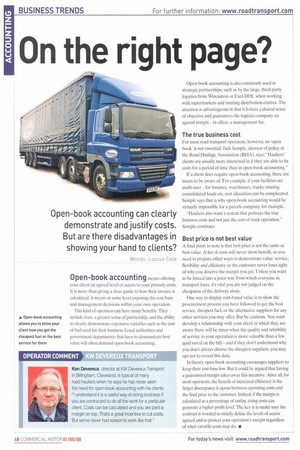On the right page?
Page 48

If you've noticed an error in this article please click here to report it so we can fix it.
Open-book accounting can clearly demonstrate and justify costs. But are there disadvantages in showing your hand to clients?
Words: Louise Cole
Open-book accounting means offering your client an agreed level of access to your primary costs. It is more than giving a clear guide to how their invoice is calculated: it means at some level exposing the cost base and management decisions within your own operation.
This kind of openness can have many benefits. They include trust, a greater sense of partnership, and the ability to clearly demonstrate expensive variables such as the cost of fuel used for their business. Local authorities and government departments that have to demonstrate best value will often demand open-book accounting. Open-book accounting is also commonly used in strategic partnerships, such as by the large, third-party logistics firms Wincanton or Exel-DHL when working with supermarkets and running distribution centres. The situation is advantageous in that it fosters a shared sense of objective and guarantees the logistics company an agreed margin — in effect, a management fee.
The true business cost
For most road transport operators, however, an 'open book' is not essential. Jack Semple, director of policy at the Road Haulage Association (RHA). says: "Hauliers' clients are usually more interested in if they are able to fix costs for a period of time than in open-book accounting."
If a client does require open-book accounting, there are issues to be aware of. For example, if your facilities are multi-user for instance, warehouses, trucks running consolidated loads etc, cost allocation can be complicated. Semple says that is why open-book accounting would be virtually impossible for a parcels company, for example.
"Hauliers also want a system that portrays the true business costs and not just the cost of truck operation," Semple continues.
Best price is not best value
A final point to note is that best price is not the same as best value. A list of costs will never show benefit, so you need to prepare other ways to demonstrate value, service, flexibility and efficiency so the customer never loses sight of why you deserve the margin you get. Unless you want to be forced into a price war, from which everyone in transport loses, ifs vital you are not judged on the cheapness of the delivery alone.
One way to display cost-based value is to show the procurement process you have followed to get the best service, cheapest fuel, or the alternative suppliers for any other services you may offer. But be cautious. You must develop a relationship with your client in which they are aware there will be times when the quality and reliability of service to your operation is more valuable than a few quid saved on the bill — and if they don't understand why you don't always choose the cheapest suppliers, you may opt not to reveal this data.
In theory, open-book accounting encourages suppliers to keep their cost base low. But it could be argued that having a guaranteed margin takes away this incentive. After all, for most operators, the benefit of increased efficiency is the larger discrepancy it opens between operating costs and the final price to the customer. Indeed, if the margin is calculated as a percentage of outlay, rising costs can generate a higher profit level. The key is to make sure the contract is worded to strictly define the levels of access agreed and to protect your operation's margin regardless of what variable costs may do. •




















































































































































































